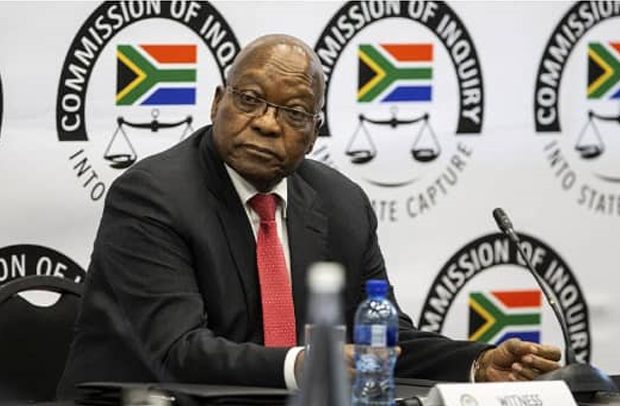Jacob Zuma
Former president Jacob Zuma has effectively dared the Constitutional Court to send him to prison for contempt as he continues to attack the legitimacy and integrity of South Africa’s judiciary.
But, at a time when the country’s judges most need to show a strong and united front, the Judicial Service Commission process has exposed just how deeply politicised and seemingly rudderless the judiciary has become.
Never was this more evident than in Chief Justice Mogoeng Mogoeng‘s headline-grabbing comments about his 2016 interaction with then-finance minister Pravin Gordhan – comments which almost certainly sunk Judge Dhaya Pillay‘s prospects of being nominated for a Constitutional Court position.
Pillay is currently serving as an acting justice at the Constitutional Court. She is also one of the justices who must decide whether Zuma should be convicted of contempt for failing to obey the court’s ruling that he appear before the state capture inquiry and answer non-incriminating questions and, more controversially, if he should be sentenced to jail time for that defiance.
As the judge who issued an arrest warrant for Zuma when he failed to arrive for his corruption trial and ruled he had defamed former minister Derek Hanekom by referring to him as a “known enemy agent”, she also has a massive target on her back.
In a 21-page letter sent to Mogoeng on Wednesday, Zuma took specific issue with the fact that Pillay is one of the judges who will decide his fate in the inquiry’s contempt case against him. Zuma has described her as “a judicial officer whose judicial antipathy towards me is well-recorded in a court judgment and an order for my arrest while I was in hospital”.
Pillay had issued a suspended order for Zuma’s arrest after his lawyer produced what she regarded as inadequate evidence of his alleged ill-health when he failed to attend one of his corruption trial hearings. Her order was subsequently lifted.
“I found the participation of acting Justice Pillay particularly disturbing and a clear indication of her unmitigated lack of discretion and a deeply irresponsible exercise of judicial power,” Zuma stated in his letter to Mogoeng, in a repeat of criticism he has previously levelled at the judge.
Economic Freedom Fighters (EFF) leader Julius Malema had taken up Zuma’s cause during Pillay’s Constitutional Court interview on Tuesday, by referring to her as “nothing but a political activist” who belonged to Gordhan’s faction. Pillay, who had acknowledged she and Gordhan had become friends during the anti-apartheid struggle in Durban, denied this.
Mogoeng, however, did not let the matter lie there and related how Gordhan – then the finance minister – had asked for a meeting with him, he recalled, in relation to the Tax Ombud. At the time, the JSC had just conducted interviews and Pillay had applied for a position at the Appeal Court.
“But what stuck in my mind was he asked me a question: ‘How did my friend Dhaya Pillay perform?’
“We had just announced the results, it was public knowledge that you did not make it. This thing has stayed with me. It got renewed as Malema engaged you.
He said, “Why did the minister make an effort to meet me? We are not friends. I don’t know him from anywhere except from television. Why did he make a trip to seek an audience with me to ask me how did ‘my friend’ perform?”
“Is it potentially compromising to judicial independence and impartiality for a minister or a senior politician to be keenly interested in the upward mobility, or to look like he or she is interested in the upward mobility of a judge?” Mogoeng asked.
Pillay said she was not aware of the interaction and Mogoeng acknowledged Gordhan had simply asked how she had done, and did not say “anything like ‘you should appoint her’”.
But the damage was already done.
The EFF announced it would lay criminal charges against Gordhan for “abusing his authority in attempting to influence the Chief Justice is Mogoeng Mogoeng in the appointment of Dhaya Pillay as a judge”.
Credit: thepressradio


